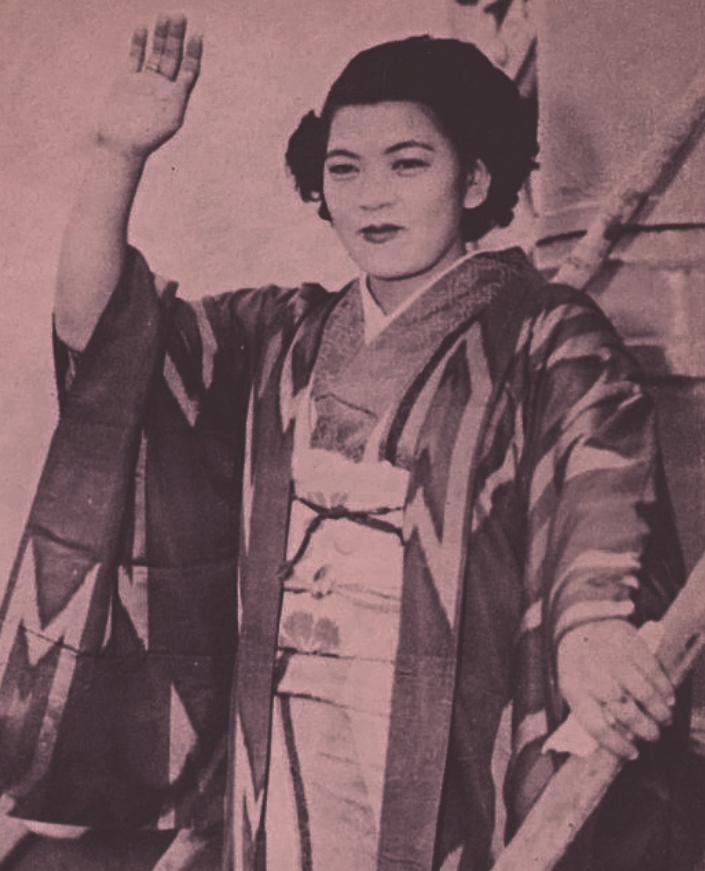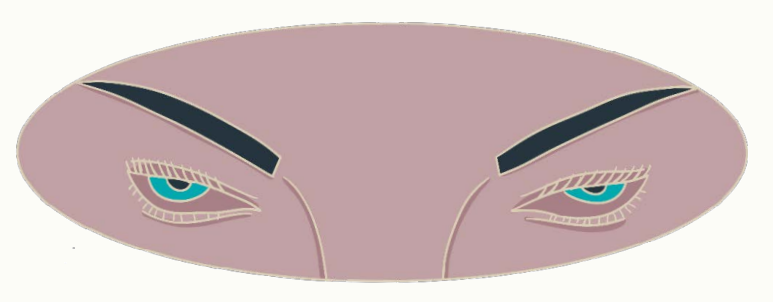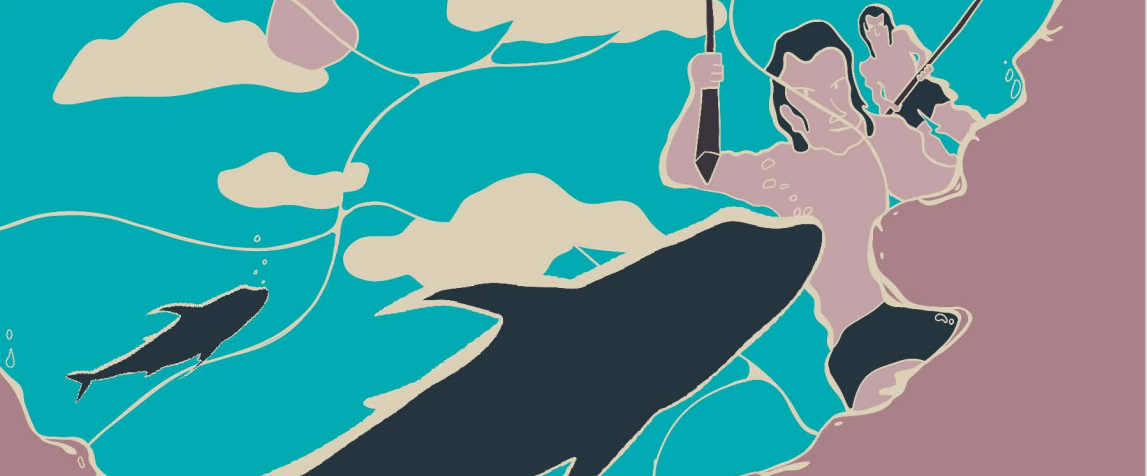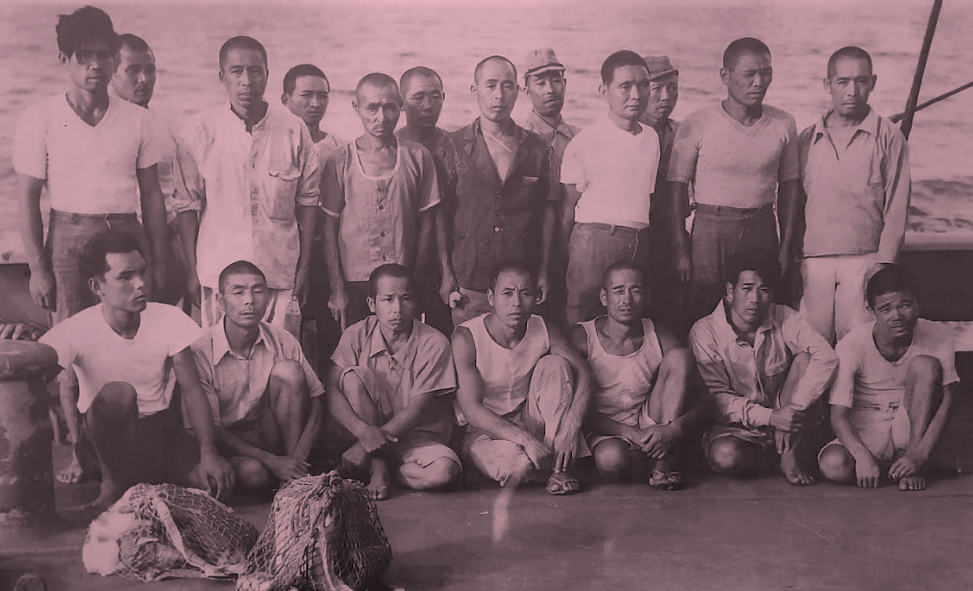On this remote island where the war never ended, a lone woman practices fatal power over a community of castaways that worships and fears her.
Adapted by Jessica McDonald and the author from the original 1951 map by Michiro Maruyama.
THE CHOICE WAS HERS.
The castaways had gathered near the huts with a mix of dread and anticipation. The lone woman looked down at the men around her, as if to size them up. They were alone on this island with no outside contact for many months and no reasonable hope of rescue. In their isolation a kind of order had set in, a brutal and austere—though perhaps more honest—stand-in for the war-torn world they had left behind.
Kazuko Higa arriving in Yokohama / November 1925
They were twenty men and one woman. Her name was Kazuko, an Okinawan in her twenties, and she wore a dress crafted from an abandoned nylon parachute. She had taken on an almost supernatural significance for this small clan. As she surveyed the men, a jungle cat lay curled placidly at her feet.
Kazuko held a power over the others, unspoken but keenly felt. Attraction yes, but also fear, something dark and foreboding. The men jockeyed for her attentions even as the most brazen intoned in whispers that she would bring them to ruin. She had favored different lovers since this lonesome island had become their home. Each of her previous “husbands” had died, each under circumstances that could not be explained.
Now she was about to choose the next, and the clan awaited her pronouncement tensely.
A hush.
Her face settled. She had chosen.
SIX YEARS EARLIER …
Soldier Michiro Maruyama, 35, spotted four twin-motored, light-blue planes flying in formation. They were too far away at first for him to tell if they were Japanese or American. In an instant, however, the bombers, now unmistakably American, began to dive toward Maruyama’s S.S. Hyosuke, a small whaling ship traveling with a convoy of fishing boats from Yokohama to Saipan and finally to Truk Island. Soon, Maruyama heard “the earsplitting sound of shelling.” Next came tracer bombs.
Michiro Maruyama with samisen / circa 1951
Maruyama dove for cover as explosions momentarily deafened him. He reached for a rifle, but it had been too damaged in the melee for use. “I could not control my fright,” he later remembered. Out of the entire convoy of soldier-operated fishing boats, there were only “two submachine guns and twelve rifles.” In hindsight, Maruyama wondered how the Japanese military could justify such a defenseless trip during June 1944, when dozens of American bombers were scouring the Northern Mariana Islands for Japanese targets. Here they were, 19 days into the journey, sitting ducks: “It was the height of insanity.” When Maruyama finally lifted his head during a lull in the bombing, he was alone on the deck, his right arm grazed and bleeding and his right knee two bullets heavier.
Three of the surviving ships started to limp closer to a rugged island with a decapitated conical crest. Once they were less than half a mile from its rocky shores, survivors jumped into the Pacific and swam, abandoning the faltering vessels. Maruyama was placed on a board and helped to shore. As bombs continued to detonate the ships around him, Maruyama collapsed onto the beach, his body “covered all over with sand and gravel.” Near him were three dead bodies, victims of the shelling, one with “his intestines half out,” his eyes “glaring in my direction.” Another’s “chest had been ripped open by shellfire.” The pain in his knee tormented him, but Maruyama knew he was one of the lucky ones.
The survivors struggled up the beach. The only sign of civilization was a coconut plantation. A few of the laborers, members of an indigenous group unfamiliar to the men, had waded into the ocean to help them as the bombed ships burned and sank beneath the waves in the distance. The natives bore tattoos of fish and “men with black eyeballs” across their arms and chest. As soon as they had come, they seemed to vanish, withdrawing quickly to the hills beyond. The men soon became aware of many others watching from those same hills, half-glimpsed figures peering out from the dense terrain.
Maruyama and the others took stock of those who had perished and inventoried their meager supplies. They were in a tight spot, washed ashore on a sparsely occupied remote island far from home, cut off from rescue by the enemy. They numbered 31, and several of them, including Maruyama, were wounded. But they were alive, and this island, whose very existence seemed a miracle in the vastness of the ocean, had saved them. In addition to coconuts, they noted papaya and banana trees growing, and there were even a few pigs and chickens, evidently kept by the laborers.
Still recovering from their shock, one of the men spotted an astonishing and hopeful sight, a Japanese man and woman coming toward them, so out of place in this tropical no-man’s land as to take the form of apparitions. The man introduced himself as Kikuichiro Higa from Okinawa. He was superintendent of the plantation, he explained. By his side was Kazuko Higa, a young woman of 22.
“I had at first mistaken her for a child,” Maruyama would remember, recalling how timid and unassuming the superintendent’s wife seemed. She had on a “very dark one-piece suit,” he noted, an odd garment for the sweltering heat.
The livestock on the island was in short supply but the survivors could help themselves. Less hopefully, the men understood that there was no way to communicate with the outside world, no chance of sending a distress signal or informing those back home what had happened. It was an agony for men with wives and loved ones back home, who they knew would soon endure the pain of their disappearance.
Then, almost as soon as they arrived, the couple withdrew. The survivors had been glad to meet them, although the pair struck the shell-shocked men as furtive and uneasy, as if weighed down by some unspoken secret.
WEAK BUT ALIVE, the soldiers healthy enough to do so set up in huts built by the natives. On the island’s north shore, they found a little settlement, the huts ominously abandoned. They tried to instill some military discipline but were exhausted, and rationing proved difficult. Days passed, then weeks, and in no time they had consumed all of the available livestock. “We had no plans of any kind,” Maruyama would recall later. Hope was tenuous. A few of the healthy men tried their hand at fishing as a means of supplementing the island’s cloying fruit. One of these men failed to return, and then another vanished. The soldiers could only assume the men had drowned on the rocky coast, but the disappearances, combined with the pressing heat and long, aimless days under the mostly unseen eyes in the hills above, added to their unease.
The superintendent, Kikuichiro, or his wife would appear unexpectedly and at random intervals. Kikuichiro often came alone, helping the soldiers with food and medical equipment. Maruyama sensed “a dark spot in him somewhere.” He saw a streak of bitterness and unhappiness— as if Kikuichiro had been wronged in some way but could not express it. Whenever Kazuko joined her husband, the couple acted peculiarly, as if putting on a performance. Still, Kazuko, for all her quietness, seemed possessed of deep abilities. She was well versed in roots, edible seeds, fruits, fish, crabs and vegetables, and she turned this talent toward helping the wounded soldiers heal. Maruyama was still picking at maggots in his wounded knee, doing his best to be of use. One day, Kazuko offered him a slice of bonito, a fish known to help improve energy levels. His knee began to heal.
During the first eight months on the island, Maruyama and the other soldiers vacillated between sickness, hunger, despair and depression. Even as they felt the eyes of the distant watchers, they felt forgotten, as if they had slipped out of time. That despondency would yield to sudden panic when, on clear days, the men could see the far off island of Saipan being bombed relentlessly. What would they do if the Americans turned their sights to their small island, which was both their salvation and their prison? They were trapped, disregarded by the cruel war but still subject to its looming terrors.
Two carbine rifles and a small amount of ammunition had been salvaged from the shipwrecks, as well as one of the fleet’s machine guns.
To dissuade the Americans from coming ashore, the lone machine gun was placed on a hillside for all to see.
A LANDING SHIP ANCHORED off the island. A native man, one of the few emissaries who interacted regularly with the Japanese soldiers, made it known to Maruyama that the Americans had indeed arrived. Eerily, they chose not to come ashore right away. At night, the only sound from the menacing ship was a solitary horn of some sort, the melody drifting over the water.
After that, the natives on the island seemed to vanish altogether. The soldiers had never felt more alone or exposed. Without enough supplies or weapons to defend themselves, they hunkered down along the northern shore, “waiting for death,” as Maruyama put it.
With the arrival of the Americans, superintendent Kikuichiro and his wife Kazuko, who had kept a cautious distance until then, joined the shipwreck survivors. They moved together for safety deep into the mountains. Almost at once, Kazuko began to emerge as an expert in the rough jungle terrain. To calm the men’s nerves, she cut the stems of coconut buds and let the sap drop into half a coconut shell, which she fermented into tuba, or coconut wine. She explained to the men that the wine was essential to daily living. Not only would it fill them up, but it made them drunk and often sleepy.
The process of making the wine became part of the morning routine, and Kazuko put the men to work climbing coconut trees, partly for the wine, but also to look out for any approaching boats. Supplementing the wine was a steady diet of fish, land crabs, lizards, papaya, and special herbs, which Kazuko taught the men to identify and pluck from trees.
Eventually, after rooting around the island, the Americans departed.
Growing bolder and venturing to the sea, two men caught a white fish with red eyes. The fish was poisonous and they fell deathly ill, but Kazuko used the bark and leaves from a tree to make a potent tea. The men drank it and soon felt much better. They recognized and began to count on Kazuko’s power, though some among them also feared that she was a destabilizing influence. A lone woman among a large group of desperate men spelled trouble, they believed, and there was no escaping the fact that there was something off about the relationship between Kazuko and her husband. They acted like a stable couple but were often cold with each other. Combined with Kazuko’s facility with local flora and fauna, a superstitious anxiety began to spread.
During one dangerous trek toward the northeastern side of the island, Kazuko cut her thigh on the trunk of a tree that someone preceding her had chopped down. Surreptitiously, one of the men, perhaps using this small imposition as an excuse for some deeper distrust, suggested she be killed so as not to impede their progress. In whispers, two of the party objected. Kazuko betrayed no hint that she had heard them.
As if to keep them off guard, the Americans reappeared as quickly as they had left, this time accompanied by an aerial bombardment. The group of castaways, now including Kazuko and her husband, dug holes and hid deep in bushes as they moved through the jungle trying to elude the bombs.
For a time, the sky fell silent. After several bomb-less nights, gripped by fear, a few of the men went overboard on the tuba wine and fell into a deep sleep. To their horror, they awoke to find themselves surrounded by American GIs moving toward their position. The castaways fled in terror. Kazuko became separated from the others in the chaos. When she was next spotted emerging through the jungle, she told the others resolutely, “If discovered, I was going to cut my throat.”
Shortly after the bombardment, a large Japanese patrol ship circled the island several times blaring an announcement through a megaphone: “To all Japanese troops! On August 15, the Emperor of Japan proclaimed his complete surrender. The war is over. All can now board American ships and go back to Japan.”
Maruyama and the others didn’t believe it. “This is an enemy plot,” one man said. “How can Japan be defeated? Unthinkable!” said another. “Sons of bitches! Resist them stoutly.”
And so they vowed to continue to conceal themselves on the island. In refusing to believe the war could have ended, the castaways chose an alternate reality. Now they would have to create a world according to their own rules.
As for Kazuko, she remained silent on the matter.
“KAZUKO,” ONE MAN SAID. “Tonight, won’t you marry me?”
The boldness of the gesture, right in front of Kazuko’s husband Kikuichiro, stunned the group.
Kazuko brushed off the comment. “I’m married. I can’t have two husbands.” Even so, Maruyama, older than the rest and a keen observer, noticed Kazuko’s face open “like a bud.”
Kikuichiro must have noticed also. He sprang forth and began to yell at Kazuko. Maruyama and the others had seen outbursts like this before, which infuriated the men. Kikuichiro was considered a “beast” by the others.
Around then a rumor began to spread, one that stirred shock and resentment: Kazuko and Kikuichiro were not really married. Rather, their relationship had been a smokescreen, an attempt on the part of Kikuichiro to keep the castaways from regarding Kazuko as romantically available. Whether this was done for her protection or out of a deep-seated desire no one knew, nor was it clear where the rumor had started. Could Kazuko herself have been the source?
In the wake of this seismic revelation, fights began breaking out, and the brashest among them baited Kikuichiro into altercations. One night, two of the boldest men, Yanagibashi and Nishino, sang a drunken song as loud as they could. Their lyrics became crude and violent. An angered Kikuichiro confronted Nishino, known to be intense and unhinged, and they fought. Kikuichiro was saved by another soldier who had to nearly knock Nishino out from behind with a board.
Kazuko looked on, and Maruyama sensed something shifting in her. What he read in her was not the immature satisfaction of a person who has become desired and fought over, but something steelier, like a growing sense of real power. On many occasions, Kazuko secretly met Nishino, who brought her gifts while Kikuichiro was away, and rumors of their relationship spread across the camp.
The intrigue was broken only when a large American ship, painted red, approached the island, forcing them all to flee to higher ground. Climbing four hours to the island’s highest point, Kazuko spotted an object that refracted sunlight. She led a party descending the mountain, where they found the wreckage of a B-29 Superfortress, a twin engine plane.
When Kazuko and Kikuichiro arrived at the crash site, they realized that the bodies of the pilots—no one could have survived such a wreck—were nowhere to be found. What they did find lifted their spirits: steel fragments, brass wire, nylon parachute fabric, sheets of aluminum, metal boxes. Kazuko in particular seemed pleased. With these implements they could fashion the bare materials of a real civilization: needles and clothing, fish hooks, knives, chisels, pots, pans and utensils. Maruyama, a professional lute player, devised a crude instrument using copper wires and parachute cords, reintroducing music into their lives.
At the crash site, Kazuko dug around in the dirt and discovered a ring with a blue stone. This discovery fairly amazed the group. Kazuko affixed it to her neck with parachute cord, a talisman that she maintained was charged with good luck and would keep her safe.
No one doubted it. Around the same site, as if drawn there by Kazuko deliberately, the two brash young men vying for Kazuko’s affections, Yanagibashi and Nishino, found three damaged pistols and 70 rounds of ammunition. Sacrificing the parts of one to fix the others, the two rivals each now had a workable pistol loaded with rounds.
The men often practiced shooting in the mountains. “Every time we heard shots, we raised eyebrows and whispered.”
As Maruyama later remembered, “this feat was to bring great misfortune.”
FOLLOWING THE DISCOVERY of the B29 and the riches it brought, life improved somewhat for the castaways, who increasingly turned to Kazuko as a leader. From Maruyama’s perspective, she had undergone a transformation of character since their first meeting. She had become more provocative, less fearful of the others. “She…wore only pants sometimes, with her breasts joggling, and on many days she walked about like a man carrying a knife at the belt. Her words were turbulent and her manners violent…. She could drink more wine than a man. Sitting cross legged, rapturously drunk, she was talkative.”
Maruyama went further: “...I noticed when meeting her eyes that the expression … was not what it used to be. She was restless, unsettled…. She had acquired a great boldness…. She wasn’t afraid of anybody.”
Rivalries for her affections, meanwhile, reached a boiling point, and Kazuko seemed to purposely stoke them.
The young suitor Nishino, in whom others detected an unpredictable streak, was so jealous and guarded that even small matters began to set him off. One day, at mealtime, as portions of coconut crab were distributed, an argument broke out between Nishino and another man, Taneo Goto, known to be his good friend. As the argument escalated, and as Kazuko looked on at the men, Nishino eventually reached for his pistol. A shot rang out, and Taneo Goto fell dead.
With their first murder, the group confronted a truth that had lived just below the surface of their daily lives. They had neither institutions nor clear rules for dealing with what, in their old lives, would be regarded as crimes. In such an event it might have seemed natural to look to Kazuko. Could it have been the creeping smile of endorsement they saw on her face?
Far from decreeing punishment, it became widely known that Kazuko and Nishino were carrying on an affair. He was favored by her, which gave him an aura within the group. His unchecked rage both fascinated and terrified the other castaways. He was the ‘wild man’ on the island, his actions somewhat tempered by a bullet wound near his stomach, sustained during the bombardment that shipwrecked them, which prevented him from any extreme hunting or fishing. He said in anger what others kept private, and to the younger men, his fearlessness was an inspiration.
But when it came to Kazuko, Nishino quickly grew jealous and attacked anyone he believed desired her or who brought her gifts. He put up with Kikuichiro, but he let his position be known to all: “[Kazuko] loves me most.”
In the time after Goto’s death, Yanagibashi, pushed to the sidelines by Nishino’s sudden rise in status within the group, waited for his opportunity. Each man was armed with pistols and over a dozen American hand grenades found in the wreckage. Both men desired Kazuko obsessively, and on an island without established rules, their armed authority put them on a collision course.
One night, after a few rounds of coconut wine, the two began to quarrel. Soon, Nishino passed a message around to the other younger men: I will kill Yanagibashi in one week.
Yanagibashi decided to take action first and visited Nishino’s hut. He tried to be civil, and they drank wine, both on edge. Yanagibashi stayed overnight in the hut, but panic swelled within. If he slept, he was sure Nishino would stab or shoot him. “It is as if [Nishino’s] evil face comes floating between my eyelids,” Yanagibashi said. “If death it is to be, better that I kill him first.” Awakening Nishino, Yanagibashi aimed his pistol and fired twice.
FOLLOWING NISHINO’S DEATH, rumors stirred that it was Kazuko who may have motivated Yanagibashi to do away with her lover. Nishino had wielded a kind of fearsome influence over the others. Needing to consolidate that authority, he might one day soon have installed himself as leader of the lawless group. Kazuko, who by now had adopted a jungle cat that behaved as a feral beast except in her presence, may not have been able to abide that challenge. His death was a clean sweep, as well as a poignant reminder that their budding civilization had been built upon a ruthless and shifting foundation.
Kazuko’s hold over the group began to tighten, and their devotion to her only grew. A short time after killing Nishino, Yanagibashi visited Kazuko and Kikuichiro’s hut. Yanagibashi held both pistols and was direct, addressing Kikuichiro, either out of Japanese custom or perhaps too fearful to turn his attention to Kazuko herself. “I can’t stand the suffering. It is something unbearable. So I came here…. Please turn [her] over to me.”
Yanagibashi, pistols in hand, gave them one night to decide.
Kazuko had a choice. She could see that her influence and power depended on a careful wielding of others’ attitudes toward her. Yanagibashi was a simpleton, but a simpleton with two guns in an otherwise unarmed society. What’s more, she was likely aware that rumors had been spreading about her goading Yanagibashi to kill Nishino. She knew how men reasoned; if she turned her back on him now, it could snap them out of the trance they had fallen under. It was in her interest to have her subjects—for that is what they were becoming—willing to do anything for her. Kazuko agreed to move in with Yanagibashi, convincing her false husband Kikuichiro that her decision might spare his life.
Days passed uneventfully, even peacefully. Kazuko made it known how happy she was to be taking up residence with Yanagibashi, which turned him into a de facto leader of their clan. Secretly, though, she may have been hatching a plan.
One day, Kazuko, Kikuichiro and Yanagibashi went fishing late at night on the shores between Banko and Sonson Beach. They used octopus as bait and waited for a bite. Kazuko appeared somewhat fatigued. Kikuichiro, as if on cue, told her she should return to the hut. She did, and the two men agreed to continue fishing while Kazuko rested.
It was the last anybody saw of Yanagibashi. From Kazuko’s account, the young soldier was “swallowed up by the waves” as he balanced on the jagged rocks fishing. Again, suspicion engulfed the ever-shrinking group. Yanagibashi was known to be a skilled swimmer. How could he have left himself exposed?
The answer seemed clear enough: Guns or not, Kazuko wielded ultimate power.
IF THERE WAS ONE PERSON on the island who may have posed a challenge to Kazuko, it was Kikuichiro. He had known her longest and had once outranked her when he oversaw the plantation. It was now an open secret that their marriage had been contrived amid the confusion of the arrival of the castaways, but his nominal role as her husband gave him additional authority over her, a vestige of the Japanese society that they had all but liberated themselves from.
In other words, Kikuichiro was a threat.
Maruyama and many others did an island-wide search for Yanagibashi’s body. Their search lasted days, ending only when they glanced at the horizon and saw the Red Boat once again approaching.
From Maruyama’s account, “we ran away as fast as we could.” The search for Yanagibashi was “completely forgotten.” In their minds, the war was still raging.
The castaways lived in the mountains for several weeks, hiding from the Red Boat. It was during this strenuous time, when they could not eat their regular diet of taro and fish, that they relied on different kinds of food and on Kazuko’s deep knowledge of local plants.
For Kikuichiro, this proved fatal.
All at once, evidently after eating too many small mountain bananas with “large seeds,” Kikuichiro grew ill. Kazuko maintained it was a case of dysentery. She attempted to alleviate his suffering by extracting vinegar from a palm tree and feeding him yashigani, a kind of palm crab that can be administered medicinally. It was lost on few that these interventions worsened his condition. Kazuko alone was present at his death. She told Maruyama that Kikuichiro had given her a picture of his family in Japan and said, “If you ever meet my wife and [daughter], give them this as a keepsake from me.”
The others held little love for Kikuichiro, but they knew he had enough knowledge to avoid certain kinds of food. When inspecting the place of his death the next day, several men said that the “leaves of trees in that vicinity were bloodstained.”
Kazuko brushed aside these rumors. But she did not mourn. Her power consolidated, she contemplated who would be her next consort.
When the time came, the men gathered around the huts and gazed back at her anxiously as he contemplated her decision. Her face settled, and they knew she had chosen. It would be Chiba Morio, one of the younger soldiers. His gloomy countenance suggested he knew what was coming. A ceremony followed, a kind of wedding ritual devised by the group. During the wedding ceremony, Maruyama could feel the “ghosts” of Kazuko’s past men surrounding them. After a speech had been made, Maruyama compared it to “a message of condolence” toward a couple “about to start on a journey of death.”
Morio grew guarded and jealous, perhaps fearful that if Kazuko lost interest in him, he was doomed. One night, Morio accused Kazuko of cheating on him. Taking leave of his senses in his fear and jealousy, he closed in to strike her. But before he could, Kazuko grabbed him by the testicles and squeezed.
Morio yelped. “Forgive me! Please!”
Around this time, Maruyama reflected on the changes in Kazuko. “There was in her no trace now of the gentle, almost childlike girl who had come…to visit my sickbed. In accounting for this great transformation, I could conclude that perhaps she had changed her character consciously and had grown tough in order to survive among these rough and bawdy males. Or had she originally been like that?”
Kazuko didn’t let go of Morio until another young man pulled her back. Like Maruyama, none of the men could have explained the power in the woman before them. Whether they believed she was inhabited by an evil spirit, empowered by some magic in the shiny ring around her necklace, or transformed by the unforgiving nature of the island, she had become their queen.
The castaways after being rescued / 1951 | photo courtesy of NMI Museum in Saipan
POST SCRIPT
According to surviving accounts, it was Kazuko who learned the war had ended before the others. Yet she kept it secret, perhaps bent on maintaining her power in the improvised civilization on the small island of Anatahan. Eventually, she may have sensed a creeping resentment and looming betrayal. Fearing that her hold on power, and her very safety, would not last, Kazuko fled and flagged down a passing ship, becoming the first rescued in June 1950, six years after the survivors of the shipwrecks washed up on the island.
Back in Okinawa, Kazuko helped officials with the names of the men still on Anatahan, the same men who, now without their queen, wandered across the island believing the loss of her “had been the greatest catastrophe that had come to us.”
After being rescued, Maruyama reflected on the seven years he spent on the island. He concluded that, despite how much they needed her, and how much care and joy she provided, “I can’t say which was feared more, the pistol, or the woman.”
Special thanks to Archie Ajoste and Scott Russell at the Northern Mariana Island Museum of History and Culture for helping with research, and to Jessica McDonald for the map’s design.
PATRICK PARR is a history columnist for Japan Today and the author of two books, the most recent being One Week in America: The 1968 Notre Dame Literary Festival and a Changing Nation. He’s a Writing Professor at Lakeland University Japan and lives with his wife in Yokohama. Special thanks to Archie Ajoste and Scott Russell at the NMI Museum in Saipan
For all rights inquiries, email team@trulyadventure.us.















